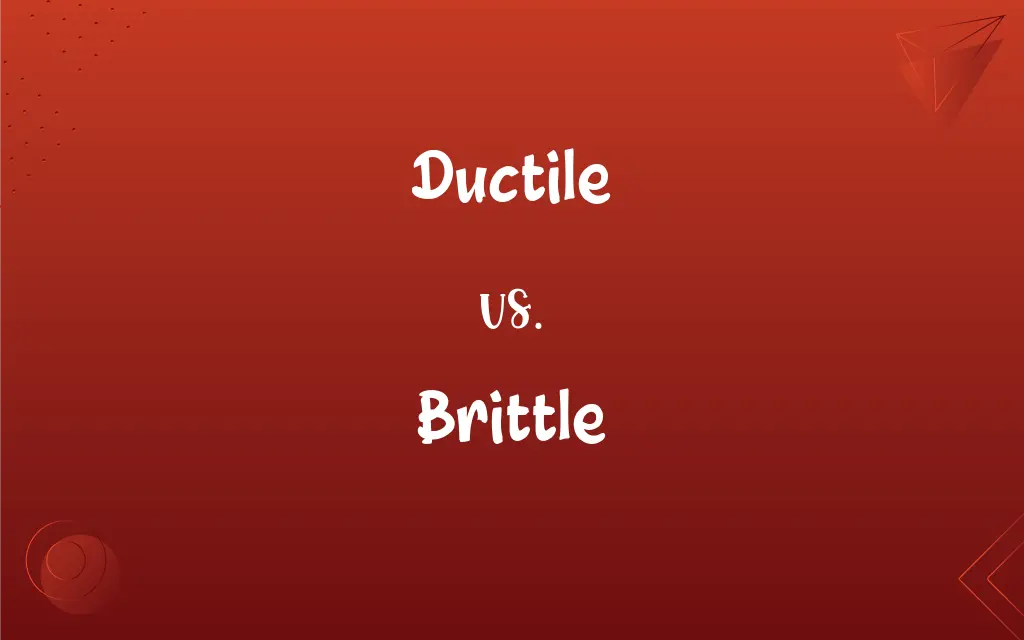Ductile vs. Brittle: What's the Difference?
Edited by Aimie Carlson || By Janet White || Published on November 22, 2023
Ductile materials can be deformed without breaking, while brittle materials break or shatter without significant deformation.

Key Differences
Ductile materials, like gold and copper, can undergo significant plastic deformation before breaking, allowing them to be stretched into wires. Brittle materials, such as glass and ceramics, lack this plasticity and break easily under stress without much deformation.
The ductility of a material is characterized by its ability to absorb energy before fracturing, evident in metals that bend or twist. Brittle materials, conversely, absorb very little energy before breaking, often failing suddenly and catastrophically.
In structural applications, ductile materials are preferred for their ability to withstand dynamic loads without immediate failure. Brittle materials, while strong, are more prone to sudden failure when their stress limits are exceeded.
Temperature can greatly affect these properties: some materials become less ductile and more brittle at low temperatures. Conversely, heat can increase ductility in some materials while decreasing brittleness in others.
The ductility of a material is a crucial consideration in fields like engineering and materials science. Brittle materials, despite their limitations, are essential in applications where high hardness and low tolerance for deformation are required.
ADVERTISEMENT
Comparison Chart
Deformation
Can undergo significant plastic deformation.
Breaks or shatters without significant deformation.
Energy Absorption
Absorbs a large amount of energy before failure.
Absorbs little energy before breaking.
Structural Behavior
Can bend or twist without breaking.
Fails suddenly under excessive stress.
Effect of Temperature
May become more ductile with heat.
Often become more brittle in cold temperatures.
Applications
Used where flexibility and toughness are needed.
Used where hardness and rigidity are important.
ADVERTISEMENT
Ductile and Brittle Definitions
Ductile
Capable of being drawn out into a thin wire.
Copper is highly ductile, making it ideal for electrical wiring.
Brittle
Hard but liable to break or shatter easily.
The brittle candy snapped into pieces easily.
Ductile
Exhibiting plasticity under tensile stress.
The ductile material stretched considerably before fracturing.
Brittle
Prone to cracking and breaking rather than bending.
The brittle ceramic tile cracked when dropped.
Ductile
Flexible and able to withstand dynamic loads.
Ductile iron pipes are used for their ability to endure ground movements.
Brittle
Characterized by little or no plastic deformation before failure.
The brittle nature of the material made it unsuitable for high-stress applications.
Ductile
Able to undergo significant deformation before breaking.
The ductile steel beam bent under the load but did not break.
Brittle
Unyielding and inflexible under stress or force.
The brittle plastic snapped when trying to bend it.
Ductile
Showing a high capacity to absorb energy before failing.
Ductile metals are preferred in earthquake-resistant structures for their energy absorption.
Brittle
Lacking plasticity and breaking easily under stress.
The brittle glass shattered immediately upon impact.
Ductile
Easily drawn into wire or hammered thin
Ductile metals.
Brittle
Likely to break, snap, or crack, as when subjected to pressure
Brittle bones.
Ductile
Easily molded or shaped.
Brittle
Easily damaged or disrupted; fragile
A brittle friendship.
FAQs
Can temperature affect a material's brittleness?
Yes, many materials become more brittle at lower temperatures.
Are all metals ductile?
Most metals are ductile to some extent, but the degree varies widely.
Can ductility be measured?
Yes, ductility is often measured by elongation or reduction in cross-sectional area.
Are ceramics always brittle?
Most ceramics are brittle, but some advanced ceramics are designed to be less brittle.
What makes a material ductile?
A material's ductility is due to its atomic structure allowing plastic deformation.
Why are brittle materials prone to sudden failure?
Brittle materials have limited ability to deform, leading to sudden failure under stress.
Is gold ductile or brittle?
Gold is highly ductile, one of the most ductile metals.
Do temperatures affect ductility in all materials?
Temperature affects ductility in most materials, but the extent varies.
Why are brittle materials used in electronics?
Brittle materials, like certain ceramics, are used for their insulating properties.
Can alloys be designed to be more ductile?
Yes, alloys can be engineered for desired ductility levels.
How does ductility affect a material's strength?
Ductility doesn't necessarily affect strength; a material can be strong and ductile.
Can brittleness be desirable in some applications?
Yes, in applications requiring high hardness and rigidity, brittleness can be desirable.
Is ductility important in automotive design?
Yes, ductility is crucial in automotive design for safety in crashes.
Does brittleness impact a material's wear resistance?
Yes, brittle materials may have high wear resistance but can crack under impact.
What role does ductility play in construction?
Ductility is important in construction for safety during dynamic loads, like earthquakes.
Can ductile materials become brittle?
Yes, certain treatments or conditions can make a ductile material brittle.
Do all brittle materials shatter?
Most brittle materials shatter or crack, but some may only chip.
Is ductility a factor in material selection for machinery?
Yes, ductility is an important consideration for parts subjected to tensile stress.
Is glass always considered brittle?
Yes, glass is typically brittle, breaking easily under stress.
Are plastics ductile or brittle?
Plastics vary widely, with some being ductile and others brittle.
About Author
Written by
Janet WhiteJanet White has been an esteemed writer and blogger for Difference Wiki. Holding a Master's degree in Science and Medical Journalism from the prestigious Boston University, she has consistently demonstrated her expertise and passion for her field. When she's not immersed in her work, Janet relishes her time exercising, delving into a good book, and cherishing moments with friends and family.
Edited by
Aimie CarlsonAimie Carlson, holding a master's degree in English literature, is a fervent English language enthusiast. She lends her writing talents to Difference Wiki, a prominent website that specializes in comparisons, offering readers insightful analyses that both captivate and inform.































































